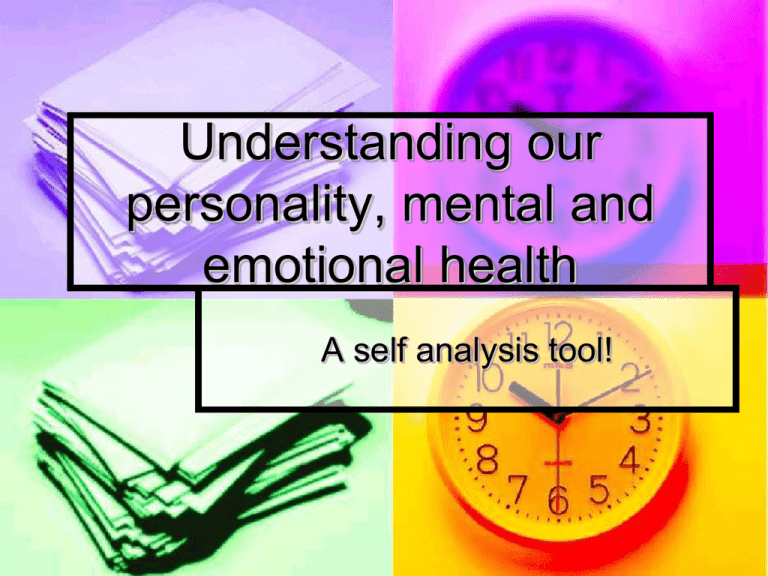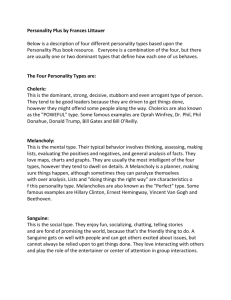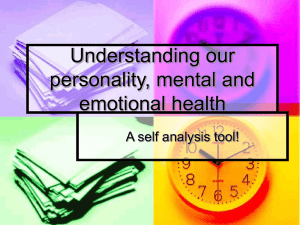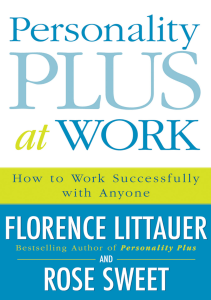Understanding our Personality
advertisement

Understanding our personality, mental and emotional health A self analysis tool! Created in His Image? God has a personality and so He created us with a personality as well. God has a mind and so He created us with a mind too! God has a emotions, He loves, weeps, and experiences anger, and so He made us with emotions as well. You are the genius of God’s creation…!!! The Bible says that we are fearfully and wonderfully made. Psalm 119 verse 73….“Thy hands made me and fashioned me!” Ecclesiastes 7 verse 29…. “God made men upright.” Psalm 139 verse 14…. “I am fearfully and wonderfully made.” The diversity of human gender, physiology, personality etc. Personality types - Sanguine Melancholy Choleric Phlegmatic Physiology - Short, tall, big, small, blonde, black, blue, grey, green, brown. - Speech - language, writing, oral, pictographic etc. Gender - male, female etc. Race - Asiatic, Arab, European, Latino, Polynesian, Melanesian, Micronesian. What is your personality like? Are you the popular Sanguine? Or the perfect Melancholy? Or the powerful Choleric? Or the Peaceful Phlegmatic? Your Personality Profile? Please complete the questions sheets that develop your personality profile and complete a quick selfexamination of who you are? What do these terms mean? The Popular Sanguine? The Perfect Melancholy? The Powerful Choleric? The Peaceful Phlegmatic? These terms describe a style/type of personality and you may be one, two or even part of three of these styles. They help us understand ourselves and others we know and live or work with. The Popular Sanguine An appealing personality Talkative storyteller Enthusiastic and Expressive Curious Volunteers for jobs Inspires and charms others Makes friends easily The Perfect Melancholy Deep, thoughtful, analytical Serious and purposeful Genius, intelligent Talented and creative Likes detail, charts, graphs etc Organised, neat and tidy Perfectionist Economical Deep compassion and concern The Powerful Choleric Born leader, strong-willed and decisive Compulsive need for change Goal oriented, organises and delegates well Thrives on opposition and emergencies Usually right and has little need for friends The Peaceful Phlegmatic Easy going personality Calm, patient, well- balanced Has administrative ability Mediates problems Easy to get on with Has many friends A good listener Our mind and emotions have a powerful affect on our personality! Sometimes our emotions are so strong they over-ride our mind and cause us to react to people and situations. We need to have healthy minds and emotions if we are going to be good leaders and servants of Christ. Our emotions and will need to be submitted to Christ and His Spirit at work in our lives. Let’s evaluate our mental and emotional health……? A self-analysis exercise; Use the sheet provided and answer the 25 questions. Rate each question with a 1 – 5 rating. 1 being Never and 5 being Always. Add the total score for the 25 questions. If your score is 65-94 that’s good but this exercise has helped identify your low areas and to be more holistic in your mind and emotions give attention to these areas. If your score is 95-114 your are an emerging leader, well discipled and suitable as a leader/trainer of others. The score 115-125 is excellent. You have a holistic worldview and have been able to apply Biblical truth to every area of your life. If your scored 64 or below we will allow some time for a personal interview to help you map a path of development Diversity in the Body of Christ is its strength! The Apostle Paul taught us in I Corinthians 12–14 that there are many parts to the Body, many gifts, many ministries and many leadership roles and styles. All are needed, all are good. We should view our trainee and slum communities in the same way. Celebrate the diversity. Male, female, mixed race, many worldviews, religions personalities etc. God created diversity. God is flamboyantly creative. It is man’s small mindedness that seek uniformity. Does our diversity of personality have a purpose? No member of the Body is complete in themselves We need each other Our strengths compliment each others strengths This makes us into the Body of Christ, just as the members of our own body are diverse, but all are needed. Diversity makes the Church strong. What is the goal of the Church? A living community… Greek word “katartizo” meaning “the mended nets” loving, knit relationships . We are to knit people together in communities that will love, care, teach, encourage, prosper etc. To be the Bride of Christ To be an example of godly, loving community in Christ-likeness We need to live in a community that sharpens our views, challenges the way we do things. A diverse Body does that. We sharpen one another as we appreciate our uniqueness. The Acts Church – an example of a strong community! - - Acts 2: 41-47 Devoted Teaching Fellowship Holy meals Prayer Sincerity of heart Sensed God’s presence Sharing wealth Hospitality - - Praise Great joy Worship Burden for souls Evangelistic zeal House based Signs and wonders Apostolic leaders Favor with the community The Acts Church learned to value its diversity….. The Acts Church started with a mono-cultural group of people but quickly became multicultural and that added great strength to the early Church. Africans, Middle Easterners, Europeans, Asians all added their strengths to the Body, all became valued members. Bringing people to maturity - - - - Making disciples Encouraging obedience to Christ’s commands Developing a motivation based on “love”Jn13:34 Being fruitful – John 15 Becoming leaders in the community Counting the Cost - Developing healthy human relationships - Laying down personal ambitions - Re-evaluating our attachment to personal possessions The unified self is made in the image of God – Genesis 1:27 We are like God with relationships and responsibilities over creation Relationships Dominion - with God - over creation - with family - control realms - with others - direct events Trainers need these tools to understand their trainees! These personality, mental and emotional health tools are helpful for trainers to understand their trainees/interns and help build them into a healthy community. When recruiting use these tools with the potential new recruits, so your can understand them and their needs. Become familiar with these tools, use them among you family as a means of practicing your skills. Acknowledgements The producer of this presentation wants to gratefully acknowledge the following persons and their publishers; Hector Avalos. Health Care and the Rise of Christianity. Hendrickson. USA Ken Anderson. Bold as a Lamb. Zondervan. USA. Neil Anderson, Zeulke and Zeulke. Christ Centred Therapy. Baker. USA Paul Billheimer. Love Covers. CLC. Canada. Larry Crabb and Dan Allendar. Encouragement the Key to Caring. Zondervan. USA. Gene Getz. Sharpening the Focus of Your Church. Moody. USA. Viv Grigg. Companion to the Poor. MARC. USA. J. Grant Howard. The Trauma of Transparency. Zondervan. USA. Samuel Lamb. Personal Interviews and conversations. China. Florence Littauer. Personality Plus. Fleming Revell. USA Kathi Mills. Broken Members, Mended Body: Building Ministry with Love and Restoration. Regal. USA. Robert S McGee. The Search of Significance. Word. USA. Ian McKellar. Violins of Change. Unknown, USA. Paul D Meier, Frank B Minrith, D E Ratcliff, Introduction to Psychology & Counselling. Baker. USA. Bryant L Myers. Walking with the Poor. Orbis. USA Ralph Neighbour Jnr. The Shepherd’s Guidebook. Touch. USA. John Pilch. Healing in the New Testament. Fortress. USA. Michael Slater. Becoming a Stretcher Bearer. Regal. USA. James Bryan Smith. A Spiritual Formation. Hodder and Stoughton. USA. Dr Joshua Sutjiono. Sermons and Interviews. Indonesia.





